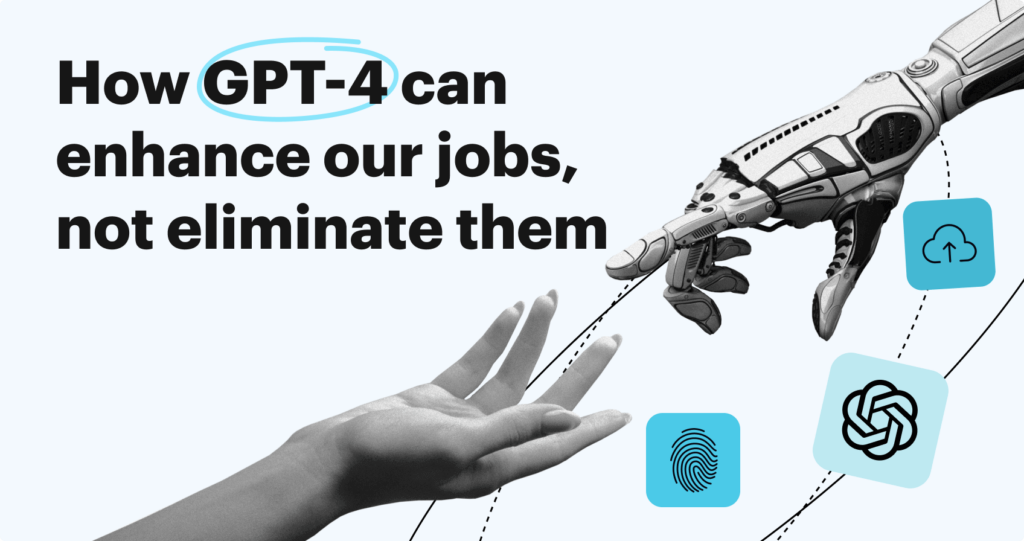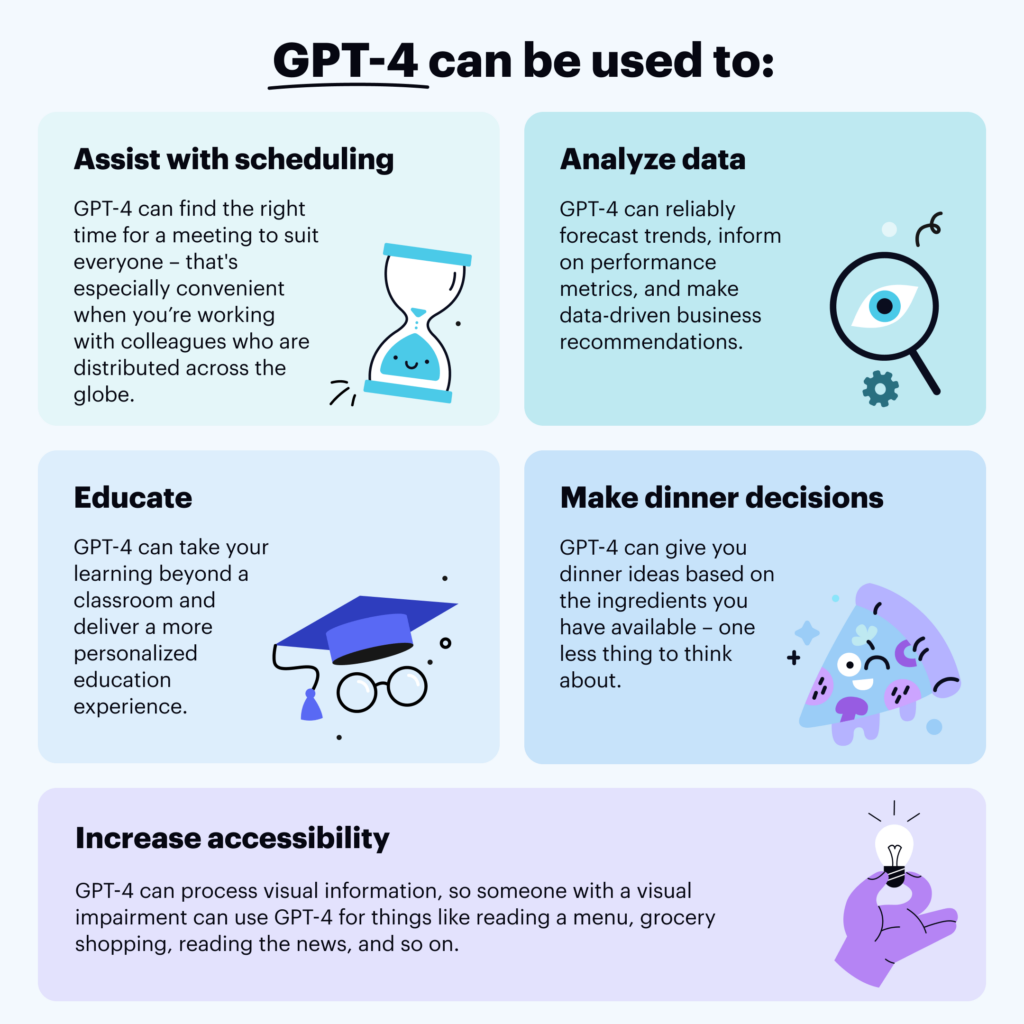GPT-4: Not a replacement! How AI can enhance our jobs, not eliminate them

The reaction to the release of GPT-4 has been somewhat polarizing. People are both excited to tinker with its automation capabilities and also apprehensive about the implications of this type of tool being widely adopted. Particularly for coders and even content marketers and copywriters, questions like “What does this mean for my job?” have been raised.
It’s important to keep an open mind about artificial intelligence. Yes, there are some job duties that may be minimized, but for the most part AI can significantly enhance one’s role, versus replacing it altogether.
Ultimately, AI will create opportunities, drive efficiency and productivity, and actually help people grow their skill set.
What is GPT-4 good for?
We read an analogy that helped put GPT-4 in perspective. It came from David Joyner, the Executive Director of Online Education and Online Master of Computer Science at Georgia Tech. He says that GPT-4 (and similar technologies) is to coding as calculators are to math.
We know that calculators did not make math obsolete or unnecessary. In fact, calculators made math much more accessible to many people. Putting GPT-4 in that context, we can have peace of mind knowing that this type of AI will bring the power of coding to prospective builders/developers who may not have the resources or time needed to learn these skills.
Think about the impact on small businesses and startups. Not only will they be able to build new products, but they can tap into GPT-4’s writing capabilities to create and run marketing campaigns while they generate the resources needed to hire full-time employees.
Aside from coding and writing, what can GPT-4 be used for? Thanks to its superior reasoning capabilities, the possibilities seem endless.

Here are some creative suggestions from OpenAI:
- Assist with scheduling. It can be a headache to find the right time for a meeting when you’re working with colleagues who are distributed across the globe. Save your brain power, let GPT-4 figure it out.
- Analyze data. GPT-4 is particularly adept at deriving meaning from data. Because of that, GPT-4 can reliably forecast trends, inform on performance metrics, and make data-driven business recommendations.
- Educate. Since the advent of the internet, students have benefitted from some form of personalized education (i.e., need to learn about a particular subject? Search the world wide web for your answers). With GPT-4, that personalization is taken to another level. Students can get tutored in what is essentially a 1:1 format using AI chatbots and take learning beyond a classroom.
- Make dinner decisions. Tell GPT-4 what ingredients you have available, and let it give you ideas for dinner. One less thing to think about.
- Increase accessibility. This will probably improve dramatically in the coming years, but GPT-4 can process visual information. So, someone with a visual impairment can use GPT-4 for things like reading a menu, grocery shopping, reading the news, and so on. This is incredible in terms of inclusivity and accessibility, bringing help to people’s fingertips in a truly impactful way.
It’s mind-boggling that an AI tool can process images, solve problems, draw logical conclusions, and almost instantaneously complete any number of tasks on our behalf. There’s a significant time and cost benefit to using GPT-4.
For example, Joe Perkins, the founder of a startup called Landscape, wrote a viral Tweet that described his experience using GPT-4 to write code for a new product his company was working on. He had gotten a quote from a developer who said it would take him 2 weeks and £5k to complete the task. But, GPT-4 got it done in 3 hours and it cost just $0.11.
As previously stated, that’s game-changing, especially for startups who don’t always have the bandwidth or resources to hire developers to build out their products, but who very much need to continue to build in order to establish themselves within a market.
So, will GPT-4 replace our jobs?
Given the anecdote we just shared, it can really feel like GPT-4 will render some jobs (like that of a developer) obsolete. But, we don’t see it that way.
We are just scratching the surface with AI. Yes, it can already do so much, but there will be so much more to come. That can be anxiety-inducing for some people as they consider the negative implications, but we have to keep in mind the positive implications as well.
And, importantly, we must remember that GPT-4 needs us. It relies on us to feed it information. GPT-4 isn’t sitting in business meetings, brainstorming and being tasked with assignments. We still have to tell GPT-4 what we need and what to do.
Yes, it can produce a script or a document, but that is absolutely dependent on the knowledge and expertise of the human using GPT-4. GPT-4’s output is completely influenced by the input it receives.
GPT-4 isn’t perfect and is still very much learning. Aside from needing to input data, us humans always need to check GPT-4’s output for mistakes and it is in our power to make the ultimate decision about if and how to use GPT-4’s recommendations.
The human component of getting work done is simply not going away.
How GPT-4 actually enhances one’s role
Having GPT-4 is like getting a booster or having a sidekick.
Let’s be real, life has been wild since 2020, and that includes our work lives. We’re suffering from change fatigue, burnout, and an unpredictable level of stress. Our brain power and capacity have been tested, if not altered. If ever there was a time for assistance, it’s now.
Here are 5 scenarios where GPT-4 can be used as a tool, rather than a replacement:
- A/B Testing. Any writer can understand the challenge of coming up with iterations for an A/B test. When writer’s block sets in, GPT-4 can actually be a great sounding board. A fresh perspective and new ideas can be just what’s needed to land on valuable copy.
- Proofreading. With long-form content, ad copy, video scripts, website pages, and more, steering clear of errors is a way to win. But, we’re only human, and no matter how many times we check our work, errors happen. GPT-4 can be an extra set of eyes when needed.
- Validating code. For developers who spend hours upon hours implementing new code only to find a bug, it can be overwhelming to pinpoint the cause of the bug. GPT-4 can be used as a tool to check one’s work and make sure everything was coded properly.
- Optimizing sales cadences. Sales representatives work really hard to find leads and nurture them through a complete sales process. Finding creative ways to follow-up with opportunities can be a challenge, especially for sales reps who work with a large volume of potential customers. GPT-4 can be a good brainstorm tool that can ultimately help close more deals.
- Strengthening the interview process. HR orgs are tasked with recruiting and retaining premiere talent. With the job market currently evolving as rapidly as it is, HR professionals may have a hard time identifying the right questions to ask and qualifiers to look for in the hiring process. GPT-4’s ability to draw logical conclusions based on data means that it has a grasp on market trends and can suggest interview questions that will aid in finding and hiring the right talent.
Why business leaders need to embrace AI
Whether the thought of AI makes your heart flutter with excitement or nervousness, one thing remains true: automation is here to stay. More and more companies are investing in automation and new automation tools are constantly being introduced.
Instead of worrying about whether or not automation and AI tools will replace headcount, business leaders need to focus on what will happen if they fail to support automation.
Benefits of automation include:
- Increased productivity
- More efficient processes
- Cost-savings
- Time-savings
- Greater job satisfaction
- Accessibility for a wider range of people, including those with disabilities
Another emerging benefit of automation is actually the creation of job opportunities. Thanks to widespread adoption of AI and machine learning tools, AI specialist roles are being created. These specialists are trained in using, deploying, and even creating automation tools and are able to adapt an organization’s use of the tools at the same speed that the tools themselves change.
It’s likely that we’ll see more and more companies hiring AI specialists to ensure their organizations remain nimble and relevant.
In sum, the question to ask is not, “What’s going to happen to my job?”. Instead, it is “What’s going to happen to my company if I don’t adopt automation?”
Our advice: learn to use it and love it because automation will continue to influence the way we work.
